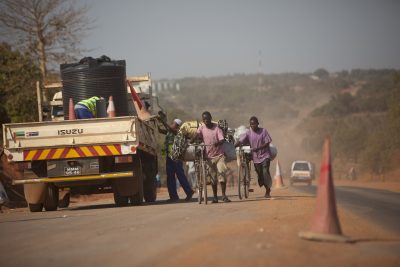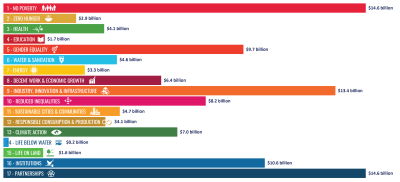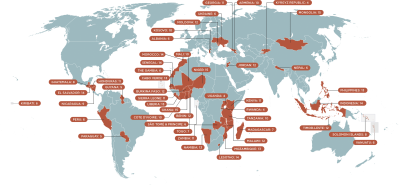
MCC’s recently signed the $500 million Mozambique Connectivity and Coastal Resilience Compact includes an investment to improve roads and bridges along critical economic routes. The Nampula-Rio Ligonha Road in Northern Mozambique is currently under construction. The compact supports 11 Sustainable Development Goals.
As a contribution to this focus on solutions, MCC asked what lessons we might find in our own evidence base. To do this, we mapped every signed investment we’ve ever made to the 17 SDGs to understand how the agency is supporting partner countries in their SDG ambitions. The results made clear MCC’s efforts to invest in poverty reduction through economic growth span the full range of the SDGs. In addition to every project supporting Goal 1 to End Poverty and Goal 17 on Partnerships, MCC’s portfolio strongly supports Goal 9 on Industry, Innovation, and Infrastructure, with over 92% of the agency’s investments supporting innovative infrastructure.

Note: MCC investments signed on or after January 2004.
First, this mapping shows that if you want to meaningfully affect people’s experience of poverty — to address the reality of need across a multifaceted human life — it turns out infrastructure is absolutely critical. There is dissonance in that lesson because people tend to associate progress on SDGs with programs that visibly interact with women, men, and families. Roads, power lines, and sewers? None of these seem to have a human face, and yet their presence or absence fundamentally affects the day-to-day decisions and experiences of individuals living nearby. This SDG mapping demonstrates in numbers what MCC has found in experience: that reliable infrastructure has a real and meaningful impact on the extent to which individuals have personal control over their livelihoods, their families’ well-being, and their own future. When we look at the depth of need for public infrastructure that meets the aspirations of a population, this is a lesson we hope others carry as well.
Second, it is affirming to find that these Global Goals remain intertwined and universally longed for. MCC’s approach to defining investments rests firmly on countries’ articulation of their own economic needs and goals. As a result, this mapping reveals that when countries set their own path to poverty reduction through economic growth, they collectively seek progress on all of these goals. MCC is sometimes asked why its portfolio is so varied, and we have always said it is because our country partners are in the driver’s seat when it comes to steering the direction of the investment. We are proud to see how much this has also driven our efforts towards advancing the SDGs.
Number of SDGs MCC is Supporting in Partner Countries

Note: MCC investments signed from 2004-2023.
As we move forward into this next push to realize the hope of the SDGs, these are the lessons MCC will carry with confidence.

